The advent of artificial intelligence (AI) has revolutionized the way businesses operate. With AI-powered tools and applications, companies have been able to improve their efficiency, increase their productivity, and streamline their processes. One such AI tool that is poised to have a profound impact on businesses is ChatGPT.
ChatGPT, a large language model developed by OpenAI, is based on the GPT-3.5 architecture and has been trained on a vast amount of data. This AI-powered conversational tool is designed to engage with users in natural language, making it possible to automate tasks that previously required human intervention. With its sophisticated natural language processing capabilities, ChatGPT can respond to complex questions, generate meaningful responses, and even engage in witty banter.
The potential applications of ChatGPT in the business world are vast and varied. From customer service to marketing, data analysis to recruitment, ChatGPT has the potential to fundamentally change the way businesses operate. In this blog, experts at our digital marketing agency will explore how ChatGPT will transform businesses and the benefits that it will bring to various areas of operations. We will also discuss some of the potential challenges and limitations of ChatGPT, as well as ways to overcome them. So, let's dive into the exciting world of ChatGPT and discover how this AI tool will revolutionize the way we do business.
Transform Your Business with ChatGPT?
- Enhanced Customer Support
- Efficient Workflow Automation
- Intelligent Data Analysis
What Is The Impact Of ChatGPT On Businesses
The impact of ChatGPT on businesses is significant and far-reaching. This AI-powered conversational tool has the potential to automate and streamline a wide range of business processes, enabling companies to save time, reduce costs, and improve their overall efficiency. Below are some of the areas where ChatGPT is expected to have a significant impact on businesses.
1. Customer Service
ChatGPT in business has the potential to revolutionize customer service by automating various aspects of the process. Here are some of how ChatGPT can improve customer service:
- Availability: ChatGPT is available 24/7, which means that customers can get support and assistance whenever they need it, even outside of regular business hours.This improves customer satisfaction by providing customer relationship management and reduces the need for companies to hire additional customer service staff to cover round-the-clock support.
- Personalization: ChatGPT can be programmed to personalize responses based on a customer's previous interactions, purchase history, and preferences. This makes customers feel more valued and enhances their overall experience with the company.
- Efficiency: ChatGPT in business can handle multiple customer inquiries simultaneously, significantly reducing wait times and improving the efficiency of the customer service process. This means that customers can get their issues resolved faster, resulting in higher satisfaction rates.
- Cost Savings: ChatGPT can significantly reduce the cost of customer service by automating routine inquiries and support requests. This means that companies can allocate resources more effectively and reduce their overall customer service costs.
Several companies have already adopted ChatGPT in business for their customer service operations. For example, H&M uses ChatGPT to assist customers with sizing recommendations and styling advice, while Bank of America uses ChatGPT to answer customer inquiries about their banking products and services. These companies have reported improved customer satisfaction rates and reduced customer service costs. Additionally, a marketing strategy agency can leverage ChatGPT to enhance clients' customer service experience.
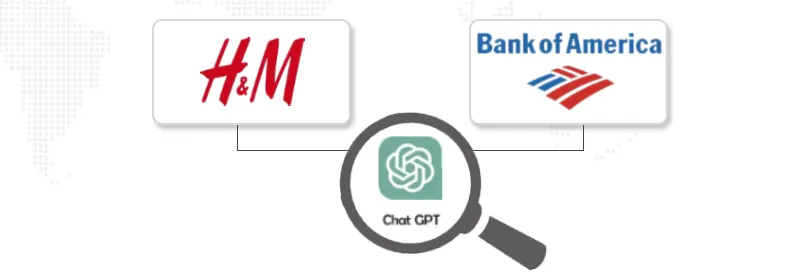
2. Marketing Efforts
ChatGPT and marketing go hand in hand. ChatGPT can significantly transform digital marketing efforts by providing a more personalized and engaging experience for customers. Here are some of how ChatGPT can improve marketing:
- Personalization: ChatGPT in marketing can be used to personalize marketing messages and recommendations based on a user's behavior and preferences. This means that companies can deliver more targeted and relevant marketing messages, leading to higher conversion rates and increased revenue.
- Engagement: ChatGPT in business can engage with customers in natural language, making it possible to automate tasks that previously required human intervention. This means that companies can respond to customer inquiries and provide support in real time, enhancing the overall customer experience.
- Lead Generation: ChatGPT can generate leads by engaging with potential customers and providing them with relevant information and resources. This means that companies can identify and nurture potential customers more effectively, leading to increased conversion rates and increased revenue.
- Cost Savings: ChatGPT can significantly reduce the cost of marketing by automating routine tasks and reducing the need for human resources. This means that companies can allocate resources more effectively and reduce their overall marketing costs.
Several companies have already adopted ChatGPT for marketing efforts. For example, Domino's Pizza uses ChatGPT to take orders and provide customers with information about their products and services. Sephora uses ChatGPT to provide customers with personalized product recommendations and makeup tutorials. These companies have reported increased engagement, higher conversion rates, and improved customer satisfaction rates. A digital marketing agency can use ChatGPT to automate social media interactions and personalize marketing efforts.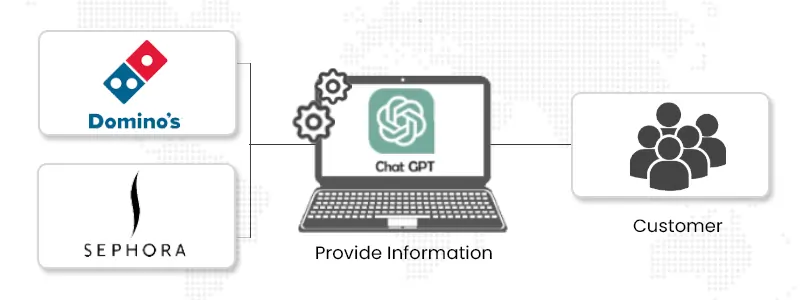
3. Data Analysis
ChatGPT has the potential to significantly transform data analysis by automating various aspects of the process. Here are some of how ChatGPT can improve data analysis:
- Natural Language Processing: ChatGPT and marketing can be used to process and analyze large amounts of unstructured data in natural language. This means that companies can gain valuable insights from sources such as social media, customer feedback, and online reviews.
- Data Interpretation: ChatGPT can be used to interpret data and provide insights in real-time. This means that companies can quickly identify trends, patterns, and anomalies in their data, enabling them to make informed business decisions.
- Prediction: ChatGPT can be used to predict future trends and patterns based on historical data. This means that companies can anticipate changes in customer behaviour and digital marketing trends and sales strategies, enabling them to adapt their strategies accordingly.
- Cost Savings: ChatGPT can significantly reduce the cost of data analysis by automating routine tasks and reducing the need for human resources. This means that companies can allocate resources more effectively and reduce their overall data analysis costs.
Several companies have already adopted ChatGPT for their data analysis operations. For example, Coca-Cola uses ChatGPT to analyze customer feedback and social media data to improve its product development and marketing strategies. Shopify uses ChatGPT to predict customer behavior and recommend products to online shoppers. These companies have reported improved business decisions, increased revenue, and reduced data analysis costs. It is worth noting that a marketing strategy agency can incorporate ChatGPT into its analysis to generate valuable insights and recommendations for businesses.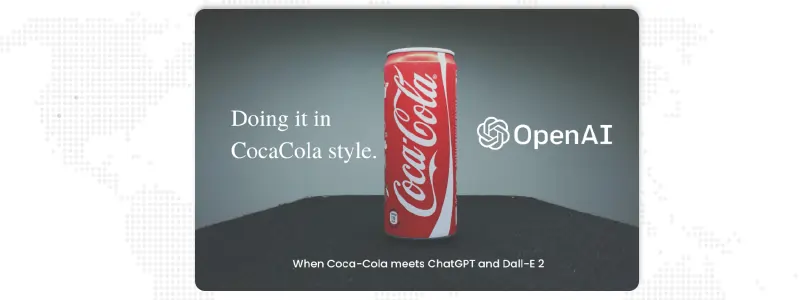
4. Recruitment
ChatGPT can transform recruitment processes by automating various aspects of the process and improving candidate engagement. Here are some of how ChatGPT can improve recruitment:
- Candidate Screening: ChatGPT can be used to screen candidates based on their resumes and responses to initial screening questions. This means that companies can quickly identify the most suitable candidates for a particular job, reducing the time and resources needed for recruitment.
- Candidate Engagement: ChatGPT can be used to engage with candidates in real-time, providing them with information about the job, the company culture, and the recruitment process. This means that companies can build stronger relationships with candidates and improve their overall candidate experience.
- Interview Assistance: ChatGPT can be used to assist with the interview process, providing interviewers with real-time information about candidates and potential interview questions. This means that companies can conduct more efficient and effective interviews, improving the overall quality of the recruitment process.
- Cost Savings: ChatGPT in business can significantly reduce the cost of recruitment by automating routine tasks and reducing the need for human resources. This means that companies can allocate resources more effectively and reduce their overall recruitment costs.
Several companies have already adopted ChatGPT for their recruitment processes. For example, Unilever uses ChatGPT to screen candidates and engage with them during the recruitment process. Hilton Worldwide uses ChatGPT to provide candidates with information about their job openings and the recruitment process. These companies have reported improved candidate engagement, reduced recruitment time and costs, and better quality of hires.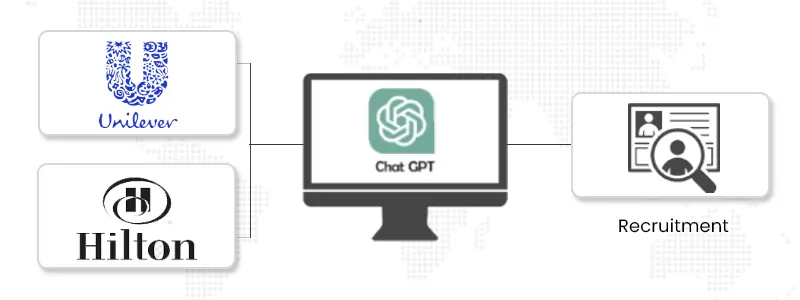
Marketing strategy services that incorporate ChatGPT can provide businesses with a competitive advantage by optimizing digital marketing strategies and improving customer engagement.
Applications Of ChatGPT
ChatGPT has a wide range of applications in various industries and fields. Here are some of the applications of ChatGPT:

- Customer service: ChatGPT can be used to provide automated customer support by answering frequently asked questions and handling simple customer queries. This can help to reduce the workload of customer service agents and improve customer satisfaction by providing fast and accurate responses.
- Marketing: ChatGPT can be used to create personalized marketing messages by analysing customer data and generating content with content creation tools that are tailored to individual customers. This can help to improve engagement rates and drive sales by providing customers with content that is relevant and interesting to them.
- Translation: ChatGPT can be used to translate text from one language to another. This can help to reduce the time and cost associated with manual translation, while also improving the accuracy and consistency of the translation.
- Data analysis: ChatGPT can be used to analyze large datasets and generate insights and predictions based on the data. This can help to identify trends, patterns, and anomalies in the data, which can be used to inform business decisions and improve processes.
- Virtual assistants: ChatGPT can be used to create virtual assistants that can perform a wide range of tasks, such as scheduling appointments, making reservations, and providing information about products and services. This can help to improve customer service and streamline business processes.
- Education: ChatGPT can be used to create educational materials, such as online courses and training modules. This can help to improve access to education and training, while also reducing the time and cost associated with creating these materials.
- Healthcare: ChatGPT can be used to provide healthcare advice and information to patients. This can help to improve patient outcomes by providing accurate and timely information, while also reducing the workload of healthcare professionals.
Pros and Cons of ChatGPT for Businesses
ChatGPT is a powerful tool that can provide many benefits to businesses and organizations. However, like any technology, there are both pros and cons to using ChatGPT. Here are some of the pros and cons of ChatGPT for businesses:
1. Pros
- Efficiency: ChatGPT in business can improve the efficiency of business processes by automating tasks and providing fast and accurate responses to customer inquiries. This can help to reduce the workload of employees and improve the overall productivity of the business.
- Cost-effective: ChatGPT can be a cost-effective solution for businesses, as it can reduce the need for human labor and reduce the cost of hiring additional employees. Additionally, ChatGPT can work around the clock, providing 24/7 support to customers without the need for additional staff.
- Customer satisfaction: ChatGPT in business can improve customer satisfaction by providing fast and accurate responses to customer inquiries. This can help to improve the overall customer experience, leading to increased loyalty and repeat business.
- Personalization: ChatGPT in business can be used to provide personalized experiences for customers, by analyzing customer data and tailoring responses to individual preferences and needs. This can help to improve engagement and build stronger relationships with customer experience strategy practices.
- Scalability: ChatGPT can be easily scaled to meet the needs of businesses of all sizes, from small start-ups to large enterprises. This means that businesses can benefit from ChatGPT at any stage of their growth.
2. Cons
Here are some of the potential challenges and limitations of ChatGPT:
- Limited understanding: ChatGPT may not have a complete understanding of every customer inquiry or situation. This can lead to incorrect or inadequate responses, which can frustrate customers and damage the reputation of the business.
- Lack of empathy: ChatGPT may not be able to provide the same level of empathy and understanding as human customer service agents. This can lead to customers feeling like they are interacting with a machine, rather than a human being.
- Technical errors: ChatGPT is not perfect and may encounter technical errors or glitches that can disrupt the customer experience. This can lead to frustration and dissatisfaction among customers.
- Limited functionality: ChatGPT may not be able to perform complex tasks or handle more complex customer inquiries. This can limit its effectiveness in certain industries and situations.
- Maintenance and updates: ChatGPT requires regular maintenance and updates to ensure that it is functioning properly and providing accurate responses. This can add additional costs and time requirements to businesses.
- Bias: ChatGPT is trained on large datasets, and if these datasets contain biased or incomplete information, it may lead to biased responses. This could have significant implications in areas such as customer service, where biased responses could result in negative customer experiences.
- Ethical concerns: ChatGPT can be used to generate text that can be misleading or used for malicious purposes. This raises ethical concerns about the use of ChatGPT, particularly in areas such as propaganda and fake news.
- Accuracy: While ChatGPT has the potential to provide valuable insights and predictions, its accuracy may be limited by the quality of the data it is trained on. If the data is incomplete or inaccurate, the predictions and insights generated by ChatGPT may also be inaccurate.
- User understanding: The responses generated by ChatGPT can be complex and difficult for users to understand. This could lead to misunderstandings and misinterpretations of the information provided by ChatGPT.
FAQs
What is ChatGPT and how does it work?
ChatGPT is an artificial intelligence language model that is capable of understanding and processing human language. It works by analyzing large amounts of data and learning from patterns in language used to generate responses to human inputs.
How can ChatGPT improve customer service?
ChatGPT can improve customer service by providing quick and accurate responses to customer inquiries and issues. It can also handle multiple customer interactions simultaneously, freeing up human customer service agents to focus on more complex tasks.
What are the benefits of using ChatGPT for marketing?
ChatGPT can help businesses to personalize their marketing efforts by analyzing customer data and providing targeted recommendations and messaging. It can also handle repetitive marketing tasks, such as email outreach, and provide valuable insights into customer behavior.
How can ChatGPT be used for data analysis?
Marketing strategy agency uses ChatGPT for data analysis by analysing large amounts of data and providing insights into patterns and trends. It can also be used to generate reports and provide recommendations based on the data analysis.
Can ChatGPT be used for recruitment?
Yes, ChatGPT can be used for recruitment by analysing resumes and job applications and providing preliminary screening of candidates. It can also be used to schedule interviews and provide basic information to candidates.
What are some potential challenges of using ChatGPT for business operations?
Some potential challenges of using ChatGPT for business operations include technical errors, lack of empathy in customer interactions, limited understanding of complex language and context, and the need for regular maintenance and updates.
What types of businesses are best suited for ChatGPT implementation?
Businesses that have a high volume of customer interactions or data analysis needs are best suited for ChatGPT implementation. Examples include e-commerce businesses, customer service call centers, and marketing agencies.
How can businesses ensure that ChatGPT is used ethically?
Businesses can ensure the ethical use of ChatGPT by monitoring its performance and regularly reviewing its interactions with customers. It is also important to set clear guidelines and standards for its use and to ensure that it is not used in ways that discriminate against certain groups or violate privacy laws.
Conclusion
ChatGPT is a game-changing technology that has the potential to fundamentally transform the way businesses operate. From improving customer service and marketing efforts to enhancing data analysis and recruitment processes, ChatGPT offers a range of benefits for businesses of all sizes and industries. It can help businesses to improve efficiency, reduce costs, and enhance the overall customer experience, leading to increased loyalty and repeat business.
However, there are also potential challenges and limitations associated with ChatGPT, such as limited understanding, lack of empathy, technical errors, limited functionality, and maintenance and updates. These challenges should be carefully considered by businesses when deciding whether or not to implement ChatGPT in their operations.
Overall, it is clear that ChatGPT is a powerful tool that can provide many benefits to businesses, and its potential for future development and innovation is exciting. As businesses continue to adopt and integrate ChatGPT into their operations, it will be important to strike a balance between the benefits and limitations of this technology to achieve optimal results. With careful consideration and strategic implementation, ChatGPT has the potential to revolutionize the way businesses operate and interact with their customers, creating new opportunities for growth and success in the years to come.
Marketing strategy services like JanBask digital design help businesses in all industries with designing and implementing their marketing strategies. Making use of ChatGPT for developing your brand strategy, and obtaining helpful insights about target audience, existing marketing campaigns and clients pain points.
Looking for Digital Marketing Services For Your Business?
- Improve Customer Satisfaction
- Improve Efficiency of Business
- Provide Personalized Experiences for Customers
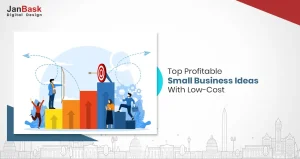








K
Wow, this blog has provided a great overview of how ChatGPT can revolutionize business operations!
R
I had no idea ChatGPT could be so useful for recruitment. Thanks for the insightful article!
J
As a marketing professional, I can see the immense potential of ChatGPT for improving customer engagement and personalization.
B
The benefits of ChatGPT for data analysis discussed in this blog are truly impressive.
C
I appreciate how the blog addressed the potential challenges and limitations of ChatGPT, and provided solutions for overcoming them.
J
This blog has convinced me that ChatGPT is the way of the future for businesses.
E
I loved the detailed examples provided for how companies are already using ChatGPT for customer service, marketing, and recruitment.
A
The blog mentions the importance of ethical AI use, which is crucial.
D
This blog really captures the potential of ChatGPT in revolutionizing business operations. The ability to have AI-driven chatbots for customer support, sales, and more will undoubtedly boost efficiency and customer satisfaction.
F
I appreciate the emphasis on data security and privacy.
H
This blog provides a forward-looking perspective on how AI-powered chat will redefine customer engagement and workflow efficiencies.